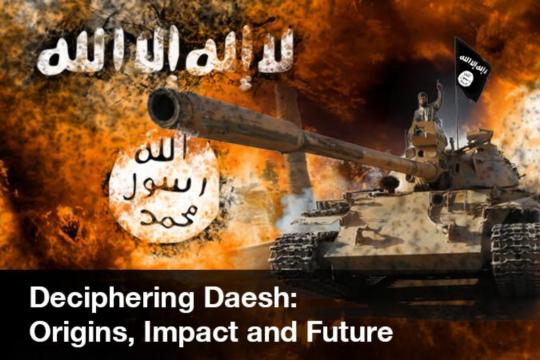
 |
| [AL JAZEERA] |
Introduction
When the Islamic State* first made its appearance as the “Islamic State in Iraq” and subsequently the “Islamic State in Iraq and Syria”, speculations began flying with little to no thorough investigation. Given that the group has expanded rapidly, capturing larger swathes of Syria and Iraq, and has gone on to declare a Caliphate and receive pledges of allegiance from groups in other countries of the Middle East and North Africa (MENA) region, there was an understandable rush to pinpoint how the group began, what kind of impact it would have on society and where it was headed.
However, this rush severely limited in-depth research and tended not to go beyond descriptive narratives, some so general that they seemed to be recycled material about other, similar groups. These reiterated analyses of the group have resulted in several strains of research on Daesh. Some take the premise it is the natural outcome and reflection of Arab societies currently undergoing dangerous transformations. Another angle is that the group is the direct result of internal political and economic divisions. Yet a third analysis is that the group is the instrument of external forces meddling in the region. For other researchers, the focus has been on creating a comparative analysis between Daesh and al-Qaeda, with one group of researchers insisting the differences are fundamental and the other group insisting that there are only surface differences and that the two groups’ views on violence are one and the same.
Taking all of this into consideration, and with the intensified media organisation and policymakers’ pursuits for credible information on the group, it was clear to AlJazeera Centre for Studies that one or two reports on the topic would provide only a surface study on Daesh, one that would not suffice to explain the origins, impact and future of the group in an analytic manner. After careful deliberation and research, the research team decided the dossier should focus on the following themes, answering the questions under each with one or more studies:
Daesh’s Ideological and Intellectual Origins
-
What are the group’s ideological origins?
-
What is the relationship between Daesh and al-Qaeda? What are the similarities and differences?
-
What is the relationship between Daesh, Salafis and Salafi Jihadi groups? Is Daesh the natural offspring of the latter?
-
What are the interpretations used to study this group?
-
How is Daesh related to the “global jihad” phenomena?
The first two reports in the dossier address these questions, the first of them by Dr. Motaz al-Khateeb and titled, “Daesh’s Intellectual Framework: From Jurisprudence to Reality”, and the second by Shafeeq Choucair, titled, “Daesh’s Ideological Origins”. Dr. Al-Khateeb is a professor of ethics methodology at Hamad Bin Khalifa University while Mr. Choucair is a researcher at AlJazeera Centre for Studies specialising in the Arab world and Islamic movements.
Daesh’s Organisational Structure and Regional and International Presence
-
How is the organisation structured?
-
Is there anything special about its organisational structure?
-
How many fighters are in the Islamic State?
-
Who are the leaders of Daesh, including whether or not they’ve spent time in prison, their ethnicity, their occupations and extent of their religious knowledge?
-
What are the components of Daesh’s structure, particularly the financial and media councils?
Hassan Abu Haniyeh, leading expert on Jihadist groups, answers these questions in his study titled, “Daesh’s Organisational Structure”.
Daesh’s Impact
-
What is the relationship between the Islamic State and Arab societies?
-
How has the Islamic State impacted societies where it has appeared?
-
What type of societal acceptance is Daesh finding?
-
Is Daesh an internal development or completely external to the societies in which it is emerging?
Journalist and writer Hazem al-Amin addresses these questions in a report based on his interviews with jihadists and their families in Lebanon, Jordan and Tunisia. The report is titled, “Sociological Challenges to Understanding Daesh”.
The Arab Spring, the Nation-State and Relationships Between States
-
How has Daesh’s advent impacted Arab Spring revolutions?
-
What impact will it have on the future of the nation state?
-
What impact has Daesh had on relationships between Arab states? What kind of future impact will it have on these relationships?
These questions are addressed in Dr. Tareq Osman’s report, “The Daesh Paradox and Political Disillusionment”. Dr. Osman is a researcher specialising in Islamic thought.
Daesh’s International Presence
-
Has Daesh’s presence spread to the Caucuses and Central Asia?
-
What is the likelihood of Daesh’s expansion in this region?
-
What are the security threats facing the Caucuses and Central Asia?
-
How will Russia and Iran handle these risks and threats?
Researcher Tamer Badawi addresses these questions in the dossier’s sixth report, titled, “Daesh in Eurasia”.
Daesh’s Future and the International Coalition
-
What are the mechanisms and intricacies of the international coalition’s war on Daesh?
-
What are the goals of this coalition’s war on Daesh?
-
What is Islamic State’s future?
These questions are answered in the seventh and last chapter of the dossier, titled, “Future of the War on the Islamic State”, by Dr. Mohammad Aburumman.
The dossier ends with a summary of new findings and realities that can aid policymakers and media organisations in understanding this group.
__________________________________
*The terms Islamic State, IS and Daesh have all become common terms to refer to the group and will be used interchangeably throughout the dossier.
| Back To Main Page |